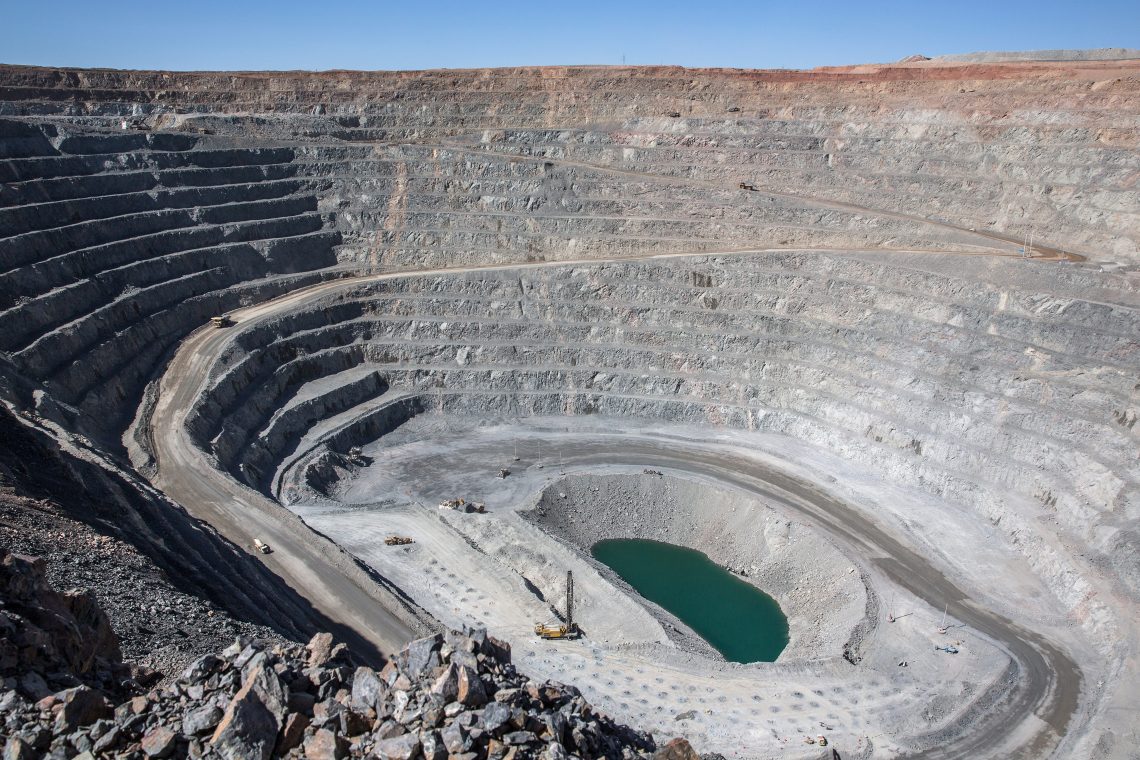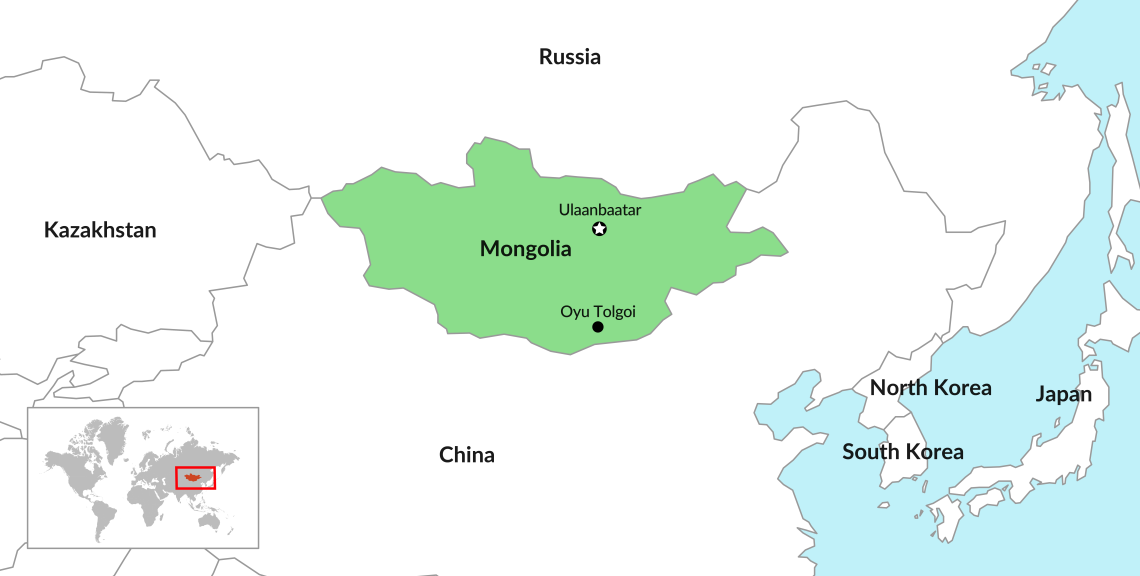Mongolia’s Oyu Tolgoi struggle
After a bitter dispute over financial provisions, Mongolia and Rio Tinto are finally moving forward with the exploitation of the Oyu Tolgoi underground mine.

In a nutshell
- Mongolia and Rio Tinto have come to an agreement
- The Oyu Tolgoi project seems on track for now
- There are still political challenges ahead
On December 30, 2021, the parliament of Mongolia adopted a resolution outlining the steps the country should take to improve its agreement with mining giant Rio Tinto, which manages the Oyu Tolgoi copper and gold mining joint venture (see box below). Then, on January 25, Mongolian Prime Minister Luvsannamsrai Oyun-Erdene and Rio Tinto CEO Jakob Stausholm inaugurated the start of the underground mining operations. Mongolia and Rio Tinto have now agreed on a path forward for the project, avoiding another protracted standoff.
The point of contention
In July 2019, it was announced that due to “unexpected and challenging geotechnical issues” and “complexities” the project would require an additional $1.2-1.9 billion in funding. Exploitation of the underground mine was to be delayed by 16 to 30 months.
The total equity investment in the project was to reach $6.75 billion, $1.45 billion more than the amount disclosed in 2015 estimates. As a result, the Mongolian government would receive no dividends at all on its 34 percent carried interest. Ulaanbaatar would end up with a $22 billion debt at the end of the project, announced Mongolian negotiators based on their own calculations. According to initial estimates, undertaken before the original agreement between the parties in 2009, the government of Mongolia had expected to start receiving dividends as of 2023. The delay also meant that the increased royalties and taxes to be paid to the Mongolian budget were to be significantly postponed as well.
Facts & figures
What is Oyu Tolgoi?

The venture has a license to develop the Oyu Tolgoi copper and gold deposit in Southern Mongolia, believed to be one of the largest in the world. The project currently produces almost 146,300 tons of copper per year from an open-pit mine. It is expected to produce 480,000 tons of copper annually once the underground mine is operational. Gold is also a major source of income.
It is the development of the underground mine, where the bulk of the valuable mineral deposits is situated, which caused a major dispute between shareholders. © GIS by macpixxel
These new figures caused a public outcry in Mongolia, where most hoped the mine would become a major cash cow for the country’s economy. On November 21, 2019, the parliament adopted a resolution that required the government to stick to the initial financial conditions and improve certain provisions.
In March 2021, the largest minority shareholder in Turquoise Hill Resources Ltd., Pentwater Capital Management, led a class action lawsuit in New York against Rio Tinto, claiming the delay was due to “deficient engineering, procurement and construction.” Rio Tinto was also accused of having failed to inform shareholders that the project would face major cost overruns and obstructions, despite having known long in advance.
The parliamentary resolution
On December 13, 2021, the chief executives of Rio Tinto and Turquoise Hill sent a proposal to Mongolian Prime Minister Oyun-Erdene, the result of two years of negotiations. In the letter, they offered to write off the debt accumulated on Mongolia’s carried interest, $2.3 billion, and to cancel the 2015 agreement signed between the shareholders of Oyu Tolgoi LLC to resolve outstanding issues. They proposed conducting an independent audit for the underground mine cost expansion and agreed to Turquoise Hill and Rio Tinto covering all additional costs until the start of production in 2023. The document also suggested suspending the current tax dispute arbitration for six months.
The project now appears poised to proceed, unless new mismanagement issues by Rio Tinto arise.
The parliament agreed to the proposal, but with a major caveat. It demanded that not only no additional debt should be incurred by Erdenes OT LLC, the state-owned company holding the Mongolian shares, but also that Oyu Tolgoi LLC, where both the government and Turquoise Hill are shareholders, not receive any additional loans from shareholders and third parties.
The request was puzzling to some members of parliament. During the debate, some MPs asked how Oyu Tolgoi LLC should raise the required funding to finish the project without loans. The head of the parliamentary working group, known for his critical views on previous deals with Rio Tinto, explained that Oyu Tolgoi LLC could pay with its own resources, including prepayment for its mineral output and new share issues.
But ultimately, the parliament resolution did not impose a total ban on new funding for Oyu Tolgoi LLC, and the definition of “additional loans” was defined in the final stages of negotiations.
Scenarios
In January 2022, Rio Tinto and the Mongolian government announced they had reached an agreement. It was decided that major issues, like funding infrastructure, will not result in additional loans for Oyu Tolgoi LLC or Erdenes OT LLC. The matters of electricity supply and increased transparency were resolved. Funding will come from available cash, an extension of debt repayment and prepayment from Turquoise Hill for copper concentrate. The termination of the Development and Financing Plan signed in 2015 and the tax arbitration dispute are still being negotiated.
This is a major win and a potentially historic legacy for the young Prime Minister L. Oyun-Erdene. The deal represents a major transfer of economic value to Mongolia. With a $2.4 billion waiver, which includes not only funding for the common share but also the accrued interest, Mongolia will receive the 34 percent equity for free, while the other sides had to invest billions. The additional costs, $1.4 billion, will have to be funded without the Mongolian shareholder, Erdenes OT LLC, incurring any more debt. Even the tax dispute is reported to have been suspended for six months pending negotiations.
The project now appears poised to proceed, at least until the next feasibility study review, scheduled to take place every five years according to the original agreement – unless new mismanagement issues by Rio Tinto arise. Certain issues raised by critics may remain unaddressed, for example, the validity of the multibillion-dollar loans taken by Oyu Tolgoi LLC from Rio Tinto. From parliamentary debates, it appears that the independent audit mentioned both in the letter and the resolution will establish whether money was spent on the project or squandered, as some claim. In any case, the agreement allows the underground mine to become operational, bringing value to all shareholders. This revenue could finally justify the embattled project, long plagued by cost overruns, political controversy and overall distrust, in the eyes of the Mongolian public – if it can be redeemed at all after years of populist attacks.
Prime Minister L. Oyun-Erdene addressed those challenges, saying the agreement is “a final leap of faith” by Mongolia. He also stressed that the government expects production to begin during the first quarter of 2023, as agreed.
Mongolia’s economy, which until the mid-2010s was one of the hottest emerging frontier markets, is suffering from lack of investment, especially from the West. The government has announced a set of goals aimed at invigorating the economy by attracting foreign investment, and the agreement with Rio Tinto could prove helpful in this regard.
Rio Tinto is the only significant Western investor in Mongolia. If the agreement had failed to materialize, Mongolia’s relations with its Western partners could have been affected. Strong and balanced relations with neighboring Russia and China are critical for Mongolia’s security and development. In parallel, the Mongolian government is trying to strengthen its ties to the so-called Third Neighbors, major global players with whom Mongolia shares democratic values.
At the inaugural ceremony, the prime minister pointed out that “the decision to commence the Oyu Tolgoi project financed by a Third Neighbor was an important step toward economic sovereignty and independence” and “Mongolia is a partner that can come to an understanding with investors, work in a stable manner and cooperate on a mutually beneficial basis.”
The failure of the negotiations would also have constituted a defeat of enormous proportions for Rio Tinto, which invested billions into the venture. The company would have become irredeemable in the eyes of Mongolian citizens.
Without an agreement after this last round of negotiations, Rio Tinto could have chosen to withdraw. Since the signing of the original deal in 2009, the press has been speculating that some actors may want to push Rio Tinto out of Mongolia. Given the size and value of the project, rival companies with an appetite for such a risky project may be hoping to replace Rio Tinto, or even actively attempting to undermine the deal.
However, for the time being, the project appears on track.
The author was one of the three signatories to the original 2009 contract in his capacity as Mongolia's minister for mineral resources and energy.








